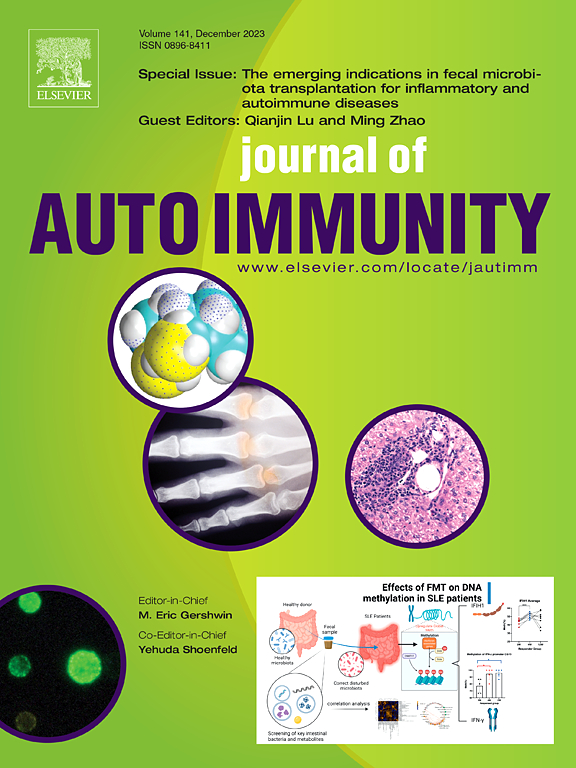miR-147-3p in pathogenic CD4 T cells controls chemokine receptor expression for the development of experimental autoimmune diseases
IF 7.9
1区 医学
Q1 IMMUNOLOGY
引用次数: 0
Abstract
Incomplete Freund's adjuvant (IFA) has long been used to trigger autoimmune diseases in animal models, such as experimental autoimmune encephalitis and collagen-induced arthritis. However, the molecular mechanisms that control CD4 T cell effector functions and lead to the development of autoimmune diseases are not well understood. A self-antigen and heat-killed Mycobacterium tuberculosis emulsified in IFA augmented the activation of CD4 T cells, leading to the differentiation of pathogenic CD4 T cells in the draining lymph nodes. In contrast, IFA emulsification did not elicit Foxp3+ regulatory T cell expansion. We found that pathogenic Th1 cells expressed miR-147-3p, which targets multiple genes to affect T cell function. Finally, miR-147-3p expressed in CXCR6+SLAMF6– Th1 cells was required for the onset of neurological symptoms through the control of CXCR3 expression. Our findings demonstrate that miR-147-3p expressed in pathogenic CD4 T cells regulates the migratory potential in peripheral tissues and impacts the development of autoimmune diseases.
致病性 CD4 T 细胞中的 miR-147-3p 可控制趋化因子受体的表达,从而诱发实验性自身免疫性疾病
长期以来,不完全弗罗因德佐剂(IFA)一直被用于在动物模型中诱发自身免疫性疾病,如实验性自身免疫性脑炎和胶原诱导性关节炎。然而,控制 CD4 T 细胞效应器功能并导致自身免疫性疾病发生的分子机制尚不十分清楚。在 IFA 中乳化的自身抗原和热杀死的结核分枝杆菌可增强 CD4 T 细胞的活化,导致引流淋巴结中致病性 CD4 T 细胞的分化。与此相反,IFA乳化并不会引起Foxp3+调节性T细胞的扩增。我们发现致病性 Th1 细胞表达了 miR-147-3p,它靶向多个基因,影响 T 细胞功能。最后,CXCR6+SLAMF6- Th1 细胞中表达的 miR-147-3p 通过控制 CXCR3 的表达,是神经症状发病的必要条件。我们的研究结果表明,致病性 CD4 T 细胞中表达的 miR-147-3p 可调节外周组织的迁移潜能,并影响自身免疫性疾病的发展。
本文章由计算机程序翻译,如有差异,请以英文原文为准。
求助全文
约1分钟内获得全文
求助全文
来源期刊

Journal of autoimmunity
医学-免疫学
CiteScore
27.90
自引率
1.60%
发文量
117
审稿时长
17 days
期刊介绍:
The Journal of Autoimmunity serves as the primary publication for research on various facets of autoimmunity. These include topics such as the mechanism of self-recognition, regulation of autoimmune responses, experimental autoimmune diseases, diagnostic tests for autoantibodies, as well as the epidemiology, pathophysiology, and treatment of autoimmune diseases. While the journal covers a wide range of subjects, it emphasizes papers exploring the genetic, molecular biology, and cellular aspects of the field.
The Journal of Translational Autoimmunity, on the other hand, is a subsidiary journal of the Journal of Autoimmunity. It focuses specifically on translating scientific discoveries in autoimmunity into clinical applications and practical solutions. By highlighting research that bridges the gap between basic science and clinical practice, the Journal of Translational Autoimmunity aims to advance the understanding and treatment of autoimmune diseases.
 求助内容:
求助内容: 应助结果提醒方式:
应助结果提醒方式:


